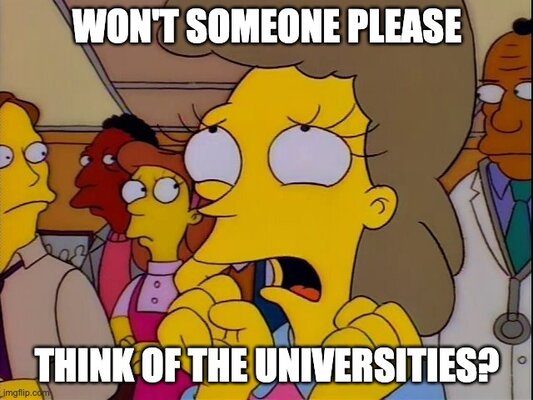College athletes are inking major NIL deals every day. But what about everyone who was punished for what the NCAA now allows?
In the past two months, the NCAA has suffered two related and devastating blows in its ongoing fight against allowing student-athletes to monetize their accomplishments at long last. The first came in the form of a stiff jab from the United States Supreme Court, which ruled unanimously that the organization had violated antitrust laws. Specifically, the Court found that schools illegally colluded to cap the educational benefits they could provide to players.
In his concurring opinion, Justice Brett Kavanaugh made it clear that he would be willing to go even further in future cases.
“Nowhere else in America can businesses get away with agreeing not to pay their workers a fair market rate on the theory that their product is defined by not paying their workers a fair market rate,” he wrote. “And under ordinary principles of antitrust law, it is not evident why college sports should be any different.
“The NCAA is not above the law.”
The second blow was a haymaker that landed just days later. With the NCAA facing mounting public and legal pressure while still reeling from SCOTUS’ rebuke, the organization finally agreed to allow college athletes to profit from their names, images, and likenesses. It’s unlikely that even incoming freshmen this fall will still be around when schools legitimately pay players for their participation in sports alone, but the benefits of NIL reform have been immediate.
Players across the country, in sports big and small, have already signed hundreds of endorsement deals. And there have been big winners, too:
- Alabama QB Bryce Young is reportedly approaching $1 million in endorsement income already despite not having taken a snap as a Crimson Tide starter.
- Tennessee State basketball player Hercy Miller, who happens to be the son of rapper Master P, signed a $2 million deal with Web Apps America last month.
- Miami QB D’Eriq King agreed to a partnership with the Florida Panthers on Monday, becoming the first college athlete to sign an endorsement deal with a major pro sports team.
If you’re in favor of a fairer future for NCAA athletes, all of this is good news.
But for many, progress has come far too late.
Consider the saga of Reggie Bush.
What Should Have Been
An absolutely electric USC running back, Reggie Bush won the Heisman Trophy in 2005 after rushing for 1,740 yards and 16 touchdowns and recording another 478 yards and two scores through the air. But five years later, the NCAA vacated Bush’s stats and the Trojans’ AP national championship, and the player was forced to return his Heisman.
All of this was due to third parties offering his family cash, travel expenses, and a rent-free home for a year.
No, not everything is legal under the NCAA’s new rules. But if Bush were playing football this fall, many paths would have been available to him to receive benefits of similar value without any penalty.
But the NCAA won’t reinstate Bush’s records. And without a game-changing development, it’s unlikely that the Heisman Trophy he rightfully earned from his game-breaking play on the field will be given back to him.
Worse yet are the fates of the coaches, agents, and sneaker company staffers who were ensnared by the FBI and Department of Justice investigation into college basketball corruption. That inquiry, which first came to light in 2017, led to charges against 10 individuals that included money laundering and wire fraud.
The underlying accusations all traced back to the illegal funneling of money to elite high school men’s basketball prospects in exchange for commitments to colleges, managers, and/or sneaker companies. The government — which only got involved due to the NCAA’s inability to enforce its own rules — actually argued that the defendants were defrauding federally funded universities by bringing top recruits to those schools. In the government’s analysis, which the courts ultimately accepted, the schools were then awarding scholarships under false pretenses.
The very schools that planned to exploit these athletes’ labor for profit were now supposedly the victims because a third party had stepped in to pay them instead.
In essence, the case came down to this:

So much of what these men were accused of is now legal and permitted. If Brian Bowen were joining the Louisville Cardinals this fall, there would be numerous above-board paths for an athletic apparel brand to compensate him and his family to the tune of $100,000 or more.
Instead, his father had to testify in federal court and Bowen was barred from playing college basketball.
Once regarded as a first-round talent, Bowen eventually went undrafted and now is an unrestricted free agent with 12 NBA appearances across two seasons. He’s still just 22, but has little hope of commanding the kind of money he could have earned had his career continued uninterrupted.
And others who were involved still face potential jail time, including infamous middleman Christian Dawkins.
To be sure, the government did catch a couple of unscrupulous individuals in their investigation. Lamont Evans, for example, took bribes to offer questionable advice to vulnerable young people and their families. He also pocketed payouts intended for players. But is that definitively worse than what NCAA schools did to their players every single season for generations?
Evans took $22,000 in bribes; the NCAA generates billions every year and has steadfastly refused to share any of the revenue with the vast majority of its workforce.
Fortunately, the NCAA has been forced to change its ways and players are starting to earn money. It’s likely that at some point in the next several years, their schools will pay them directly as well.
But the true cost of the NCAA’s decades of obstinance may never be repaid.